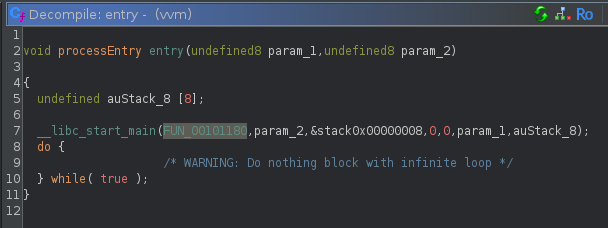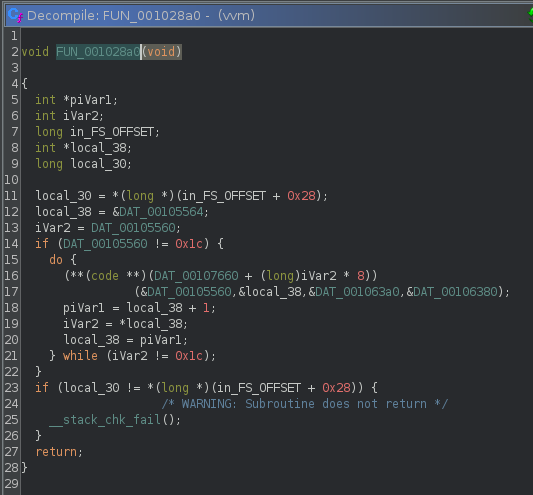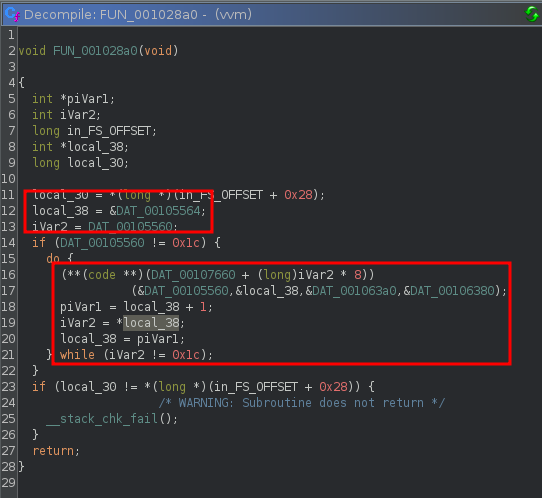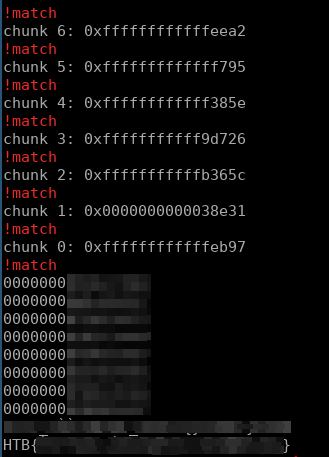
Description
“Hard” reversing challenge released about half a year ago at time of writing.
A new startup claims to have developed an unbreakable client-side password validation system. VCs have invested millions, but I'm a bit skeptical of their claim. Can you prove them wrong?
Initial investigation
Before we begin static analysis we will run ltrace against the binary to see whats going on:
ltrace ./vvm
puts("======================="=======================
) = 24
puts("vvm v0.0.3"vvm v0.0.3
) = 11
puts("======================="=======================
) = 24
malloc(224) = 0x61c7243906b0
mmap(0, 27, 7, 34) = 0x71de16538000
mmap(0, 42, 7, 34) = 0x71de164fe000
mmap(0, 25, 7, 34) = 0x71de164fd000
mmap(0, 18, 7, 34) = 0x71de164fc000
mmap(0, 56, 7, 34) = 0x71de164fb000
mmap(0, 179, 7, 34) = 0x71de164fa000
mmap(0, 37, 7, 34) = 0x71de164f9000
mmap(0, 20, 7, 34) = 0x71de164f8000
mmap(0, 59, 7, 34) = 0x71de164f7000
mmap(0, 53, 7, 34) = 0x71de164f6000
mmap(0, 40, 7, 34) = 0x71de164f5000
mmap(0, 32, 7, 34) = 0x71de164f4000
mmap(0, 20, 7, 34) = 0x71de164f3000
mmap(0, 37, 7, 34) = 0x71de164f2000
mmap(0, 50, 7, 34) = 0x71de164f1000
mmap(0, 33, 7, 34) = 0x71de164f0000
mmap(0, 37, 7, 34) = 0x71de164ef000
mmap(0, 36, 7, 34) = 0x71de164ee000
mmap(0, 21, 7, 34) = 0x71de164ed000
mmap(0, 37, 7, 34) = 0x71de164ec000
mmap(0, 36, 7, 34) = 0x71de164eb000
mmap(0, 25, 7, 34) = 0x71de164ea000
mmap(0, 27, 7, 34) = 0x71de164e9000
mmap(0, 32, 7, 34) = 0x71de164e8000
ptrace(0, 0, 0, 0) = -1
exit(1 <no return ...>
+++ exited (status 1) +++
The program allocates and maps a few memory regions, calls ptrace() and then exits. Based on experience we can confidently say that the ptrace() call is a simple anti-debugging measure. If the ptrace call returns a failure, the program is being debugged in some way and will exit. Based on this information we can start static analysis of the binary in Ghidra.
Static analysis
No symbols of course, so lets navigate to entry and drop into the first argument. If you’re not familiar this will be main

Inside we see three functions:

We are going to ignore FUN_00102940(); as it calls puts() 3 times and returns. Dropping into FUN_00101540(); we can easily get overwhelmed. I wont attach a screenshot as there are over 780 lines in the decompilation. Reviewing this function we can identify that mmap() calls we observed from ltrace are called from this function. Further examination reveals that data is being decrypted and populated in these mapped regions.
At this point I am interested in what is being decrypted and populated in the mapped regions, so I wrote a small gnu debugger script that dumps the decrypted data out for us into files:
set pagination off
define dump_function
python
ipx = int(gdb.parse_and_eval("$ipx"))
addr = gdb.parse_and_eval("$addr_list[$ipx]")
len = gdb.parse_and_eval("$leng_list[$ipx]")
fn = f"func_{ipx}"
gdb.execute(f"dump memory {fn} {addr} {addr+len}")
end
end
starti
break *$BASE+0x1198
break *$BASE+0x1191
c
break mmap
set $ipx = 0
set $addr_list = (long [24]) {0}
set $leng_list = (int [24]) {0}
c
while ($ipx < 24)
set $len = $rsi
finish
set $addr_list[$ipx] = $rax
set $leng_list[$ipx] = $len
set $ipx=$ipx+1
c
end
set $ipx = 0
while ($ipx < 24)
dump_function
set $ipx=$ipx+1
end
In a gist, this script is setting a breakpoint each time that mmap() is called and extracting the length that was allocated and the address returned from mmap. Using the gdb python api we dump each mapped region to its own file.
Reviewing the dumped files, all of them start with a byte sequence that is equal to endbr64, signifying the start of a function. It’s safe to assume that each of these mapped regions contain a decrypted function that will later be called upon.
Using capstone we can disassemble these for further investigation:
#!/usr/bin/env python3
import os
from capstone import *
l = sorted([int(x.split('_')[1]) for x in os.listdir("./functions")])
for f in l:
with open(f"./functions/func_{f}", "rb") as _f:
CODE = _f.read()
_f.close()
print(f"======= func_{f} =======")
md = Cs(CS_ARCH_X86, CS_MODE_64)
for i in md.disasm(CODE,0x00):
print("0x%x:\t%s\t%s" %(i.address, i.mnemonic, i.op_str))
print()
These functions are good to note, but currently by themselves they don’t help us out too much.
Moving into FUN_001028a0();, this looks suspiciously similar to virtual machine execution loops I have seen in the past.

At this point in time we know:
- Functions are being decrypted in stored in memory
- A virtual machine execution loop
The next step is to find the actual vm code that is executed. This is pretty easy to identify, as we have the addresses right in front of us.

iVar2 = DAT_00105560;
Navigating to DAT_00105560 in Ghidra we see a large amount of “random” bytes. Hint: these representinstructions and arguments
In this image we also identify how the functions are called in the execution loop.
if (instruction != 0x1c) {
do {
(**(code **)(jmp_table + (long)instruction * 8))
(&instruction,&local_38,&DAT_001063a0,&DAT_00106380);
piVar1 = local_38 + 1;
instruction = *local_38;
local_38 = piVar1;
} while (instruction != 0x1c);
}
I’ve modified the above snippet slightly to give you an idea of how the functions are called. There is a jump table address used as a base, the instruction value is multiplied by 0x8, the result is added to the jump table address and the function is then called. Hopefully that makes sense.
At this point we have done as much static analysis as we can, or that I’d like to.
Dynamic analysis
Sparing you from all of the testing and verifying done in the dynamic stage of analysis, overtime I built out a gdb script to automate the analysis of the program. Due to the size, I will include the scripts used at the bottom of the writeup.
I broke the program down into sections based on “execution loops”. Function 0x11, when called, behaves similar to the higher level execution loop, but performs some additional steps including instruction pointer and rcx manipulation. In this case, I counted every execution of a vm function as an execution loop:
000 - 071: strings setup
072: ptrace() call
073 - 098: strings setup and user input preparation
099: print string and read user input
100 - 102: calculate size of user input
103 - 120: math on user input length, generate compare value, check compare
At this point, if the length of the password (with math applied) you entered does not equal the calculated value, the program will begin to build another string. If the values do match, the program continues with normal execution flow.
121 - 284: disorganizes password input, example: ABCD -> CABD
285 - 491: math against disorganized password
492: perform and operation against a post-math operation value
At this point, if the AND operation does not return 0, the program will begin to build a string, print it and exit. If the AND operation does return 0, the program will continue with normal execution. It does not serve much purpose, the rest of the program performs the same action as execution loop 492, and the end result will print out a string “Incorrect :(” or “Correct!” based on the results.
My approach
There are a few different ways you can go about this. The easiest way would be to reverse the math operations used against the password input. You need to identify the order the password was scrambled in, and the math applied to each section. You can reverse this process by hand to find the compare values, or you can use z3. I used z3.
For fun, I also scripted out my own emulation of the program. To do this I took the instructions from the program, diassembled each function call and implemented the functions in my emulator.
Anyways, below is my emulator and my gdb analysis script. Enjoy!

I left out some crucial parts of this program as to not feed you the flag Also note I am no computer scientist, I wrote this program on the fly with no optimization or anything in mind, just wanted a working emulator so I could see everything from a higher level.
emulator.py
#!/usr/bin/env python3
import z3
instructions = ["add your own instructions :P"]
class colors:
HEADER = '\033[95m'
OKBLUE = '\033[94m'
OKCYAN = '\033[96m'
OKGREEN = '\033[92m'
WARNING = '\033[93m'
FAIL = '\033[91m'
ENDC = '\033[0m'
BOLD = '\033[1m'
UNDERLINE = '\033[4m'
def parser(_list, password, _length):
sb = [bytearray(8) for _x_ in range(32)]
rcx = oi = i = loop = 0
password_indexes = []
subloop = False
while i <= _length:
#print_zone(sb, rcx)
#print()
try:
v = _list[i][3]
except Exception:
print("No more instructions!")
return password_indexes
match v:
case 0x00: # gets size of user input
print(f"{loop} [FN 0x00]: size of input calculated\tRCX = {rcx}")
sb[1] = bytearray(len(password).to_bytes(8, "big"))
i += 1
case 0x01: # shl
print(f"{loop} [FN 0x01]: ", end="")
print(f"0x{int.from_bytes(sb[rcx-2], 'big'):016X} << 0x{int.from_bytes(sb[rcx-1], 'big'):02x}")
sb[rcx-2] = bytearray(int((int.from_bytes(sb[rcx-2], "big") << int.from_bytes(sb[rcx-1], "big")) & 0xffffffff).to_bytes(8, "big"))
rcx -= 1
i += 1
case 0x02: # modulus
print(f"{loop} [FN 0x02]: ", end="")
print(f"0x{int.from_bytes(sb[rcx-2], 'big'):016X} % 0x{int.from_bytes(sb[rcx-1], 'big'):02x}")
sb[rcx-2][-1] = sb[rcx-2][-1] % sb[rcx-1][-1]
rcx -= 1
i += 1
case 0x03: # userinput
# to simulate what the vm is doing, lets set ba[0] to a "ptr"
sb[0] = bytearray(int(0x000055555555c860).to_bytes(8, "big"))
rcx += 1
i += 2
case 0x04: # idiv
print(f"{loop} [FN 0x04]: ", end="")
print(f"0x{int.from_bytes(sb[rcx-2], 'big'):016X} / 0x{int.from_bytes(sb[rcx-1], 'big'):02x}")
sb[rcx-2] = bytearray(idiv_func(int.from_bytes(sb[rcx-2], "big"), int.from_bytes(sb[rcx-1], "big")).to_bytes(8, "big"))
rcx -= 1
i += 1
case 0x05: # add
print(f"{loop} [FN 0x05]: ", end="")
print(f"0x{int.from_bytes(sb[rcx-2], 'big'):016X} + 0x{int.from_bytes(sb[rcx-1], 'big'):02x}")
sb[rcx-2] = bytearray((int.from_bytes(sb[rcx-2], "big")+int.from_bytes(sb[rcx-1], "big")).to_bytes(8, "big"))
rcx -= 1
i += 1
case 0x06: # imul
print(f"{loop} [FN 0x05]: ", end="")
print(f"0x{int.from_bytes(sb[rcx-2], 'big'):016X} * 0x{int.from_bytes(sb[rcx-1], 'big'):02x}")
sb[rcx-2] = bytearray(imul_func(int.from_bytes(sb[rcx-2], "big"), int.from_bytes(sb[rcx-1], "big")).to_bytes(8, "big"))
rcx -= 1
i += 1
case 0x07: # ptrace wrapper
print(f"{loop} [FN 0x07]: {colors.WARNING}ptrace() call{colors.ENDC}\tRCX = {rcx}")
i += 1
case 0x08:
print(f"{loop} [FN 0x08]: 0x08\tRCX = {rcx}")
sb[rcx-2] = bytearray(int(int.from_bytes(sb[rcx-2], "big")|int.from_bytes(sb[rcx-1], "big")).to_bytes(8, "big"))
rcx -= 1
i += 1
case 0x09: # more math
print(f"{loop} [FN 0x09]: silly maths\tRCX = {rcx}")
if sb[rcx-1][-2] != 0:
rax = (sb[rcx-1][-2] << 8) + sb[rcx-1][-1]
rax += 0x11
else:
rax = sb[rcx-1][-1] + 0x11
_rcx = rax
rdx = 0x5555555555555556
rdx = (rdx * rax) >> 64
rax = rax >> 0x3f
rdx -= rax
rax = rdx+rdx*2
sb[rcx-1][-1] = _rcx - rax
i += 1
case 0x0a: # print_chk, free
print(f"{loop} [FN 0x0a]: print\tRCX = {rcx}")
_out = ""
for vv in sb:
if vv[-1] != 0x0 and vv[-1] != 0x0a:
_out += chr(vv[-1])
else:
break
print(f"{colors.OKGREEN}[TXT]: \"{_out}\"{colors.ENDC}")
rcx -= 1
i += 1
case 0x0b: # jmp
s = _list[i+1][3]
i += s+1
print(f"{loop} [FN 0x0b]: jmp $rip+{hex(s)}\tRCX = {rcx}")
case 0x0c: # math
print(f"{loop} [FN 0x0c]: silly maths\tRCX = {rcx}")
rax = sb[rcx-1][-1]
rax = rax+rax*2-0x06
rax += rax
if rax > 0xff:
sb[rcx-1][-1] = rax & 0xff
sb[rcx-1][-2] = rax >> 8
else:
sb[rcx-1][-1] = rax
i += 1
case 0x0d: # looping over password
print(f"{loop} [FN 0x0d]: password loop\tRCX = {rcx}")
rcx = 1
i += 1
case 0x0e: # zero out chunk
print(f"{loop} [FN 0x0e]: zero out chunk\tRCX = {rcx}")
sb[rcx-1] = bytearray((0).to_bytes(8, "big"))
rcx -= 1
i += 1
case 0x0f: # malloc to prep for user input
print(f"{loop} [FN 0x0f]: prep for user input\tRCX = {rcx}")
rcx = 1
i += 2
case 0x10: # copy one 8 byte chunk to another
print(f"{loop} [FN 0x10]: \tRCX = {rcx}")
_val = _list[i+1][3]
_rcx = rcx-0x1
_rcx -= _val
sb[rcx] = sb[_rcx] #check
rcx += 1
i += 2
case 0x11: # internal loop, ensure this works
subloop = True
oi = i + 3
_st = _list[i+2][3]
jmp_cond = _list[i+1][3] + (_list[i+2][0] << 8) # sry
print(f"{loop} [FN 0x11]: next = {hex(jmp_cond)}\tRCX = {rcx}")
i = jmp_cond
case 0x12: # grab random char from user input
_loc = _list[i+1][3]
print(f"{loop} [FN 0x12] password[{_loc}]: {chr(password[_loc])}\tRCX = {rcx}")
password_indexes.append(_loc)
_val = password[_loc]
sb[rcx-1] = bytearray(int(_val).to_bytes(8, "big"))
i += 2
case 0x13: # compare computed sizes
print(f"{loop} [FN 0x13]: ", end="")
print(f"0x{int.from_bytes(sb[rcx-2], 'big'):016X} == 0x{int.from_bytes(sb[rcx-1], 'big'):02x}")
if sb[rcx-2] == sb[rcx-1]:
print(f"{colors.OKGREEN}true{colors.ENDC}")
sb[rcx-2] = bytearray((1).to_bytes(8, "big"))
else:
print(f"{colors.FAIL}false{colors.ENDC}")
sb[rcx-2] = bytearray((0).to_bytes(8, "big"))
rcx -= 1
i += 1
case 0x14:
print(f"{colors.FAIL}! [FN 0x14] !{colors.ENDC}")
rcx -= 1
i += 1
case 0x15: # math, this might need to be fixed idk
print(f"{loop} [FN 0x15]: silly maths\tRCX = {rcx}")
rdx = sb[rcx-1][-1]
rdx = (rdx * 8) + 0x18
if rdx > 0xff:
sb[rcx-1][-1] = rdx & 0xff
sb[rcx-1][-2] = rdx >> 8
else:
sb[rcx-1][-1] = rdx
i += 1
case 0x16: # check compare result, jmp accordingly
print(f"{loop} [FN 0x16]: ", end="")
print(f"0x{int.from_bytes(sb[rcx-1], 'big'):016x} & 0x{int.from_bytes(sb[rcx-1], 'big'):02x}")
_tmp = int.from_bytes(sb[rcx-1], "big")
_tmp = _tmp & _tmp
if _tmp != 0:
print(f"adding {_list[i+1][3]} to instruction pointer")
i += int.from_bytes(_list[i+1], "big")
i += 2
rcx -= 1
case 0x17: # relative move
print(f"{loop} [FN 0x17]: mov sb[{rcx}], 0x{int.from_bytes(sb[rcx-1], 'big'):016x}\tRCX = {rcx}")
sb[rcx] = bytearray(int.from_bytes(sb[rcx-1], "big").to_bytes(8, "big"))
rcx += 1
i += 1
case 0x18: # sub
print(f"{loop} [FN 0x18]: ", end="")
print(f"0x{int.from_bytes(sb[rcx-2], 'big'):016X} -= 0x{int.from_bytes(sb[rcx-1], 'big'):02x}")
try:
sb[rcx-2] = bytearray((int.from_bytes(sb[rcx-2], "big") - int.from_bytes(sb[rcx-1], "big") & (4**32-1)).to_bytes(8, "big"))
except Exception as e:
print(f"{colors.FAIL}[!] {e}{colors.ENDC}\nExiting..\n")
print(sb[rcx-2], sb[rcx-1])
exit(1)
rcx -= 1
i += 1
case 0x19: # immediate move
print(f"{loop} [FN 0x19]: imm sb[{rcx}], {hex(_list[i+1][3] + (_list[i+2][0] << 8) + (_list[i+2][1] << 16))}")
sb[rcx] = bytearray((_list[i+1][3] + (_list[i+2][0] << 8) + (_list[i+2][1] << 16)).to_bytes(8, "big"))
rcx += 1
i += 2
case 0x1a: #shr
print(f"{loop} [FN 0x1a] ", end="")
print(f"0x{int.from_bytes(sb[rcx-2], 'big'):016X} >> 0x{int.from_bytes(sb[rcx-1], 'big'):02x}")
sb[rcx-2] = bytearray(int((int.from_bytes(sb[rcx-2], "big") >> int.from_bytes(sb[rcx-1], "big")) & 0xffffffff).to_bytes(8, "big"))
rcx -= 1
i += 1
case 0x1c:
if subloop:
_val = sb[rcx-1]
_rcx = rcx - _st - 1
sb[_rcx] = bytearray(int.from_bytes(_val, "big").to_bytes(8, "big"))
rcx -= _st
i = oi
print(f"{loop} [FN 0x1c] restore ip\tRCX = {rcx}")
subloop = False
continue
else:
print(f"{loop} [FN 0x1c] EXIT")
return password_indexes
case _:
print(f"{colors.FAIL}Hit an invalid instruction!!! [{hex(v)}]{colors.ENDC}")
exit()
loop += 1
#print_zone(sb, rcx)
#print()
def print_zone(zone, rcx, i = 0):
while i < len(zone):
if i == rcx-2:
print(f"{colors.OKCYAN}", end="")
elif i == rcx-1:
print(f"{colors.OKGREEN}", end="")
if i == 0 or i % 2 == 0:
print(f"0x{int.from_bytes(zone[i], 'big'):016x}", end="\t")
else:
print(f"0x{int.from_bytes(zone[i], 'big'):016x}")
print(f"{colors.ENDC}", end="")
i += 1
def imul_func(a, b):
return int(a * b)
def idiv_func(a, b):
return int(a / b)
def split_instructions():
count = 0
split_inst = []
cur = b""
for v in instructions:
if count % 4 == 0 and count != 0:
split_inst.append(cur)
cur = v.to_bytes(1, "little")
else:
cur += v.to_bytes(1, "little")
count += 1
return split_inst
def more_fun(pw_index, password):
pwd = [bytearray(b"\x00" * 8) for i in range(8)]
print("pw_index")
print(pw_index)
c = d = 0
for i in range(0, len(pw_index)):
if i % 4 != 0 or i == 0:
pwd[c][~d] = password[pw_index[i]]
d += 1
else:
c += 1
d = 0
pwd[c][~d] = password[pw_index[i]]
d += 1
i += 1
print("\n[+] initial sorted password chunks")
for v in pwd:
print(f"0x{int.from_bytes(v, 'big'):016x}")
andv = 4**16-1
for i in range(7, ~0, -1):
a = int.from_bytes(pwd[i], "big")
match i:
case 7:
[redacted]
case 6:
[redacted]
case 5:
[redacted]
case 4:
[redacted]
case 3:
[redacted]
case 2:
[redacted]
case 1:
[redacted]
case 0:
[redacted]
print(f"chunk {i}: 0x{z & 4**32-1:016x}")
if (z & z) == 0:
print(f"{colors.OKGREEN}match{colors.ENDC}")
else:
print(f"{colors.FAIL}!match{colors.ENDC}")
def gen_password(pw_index):
# add yourself!
pass
def runner(password):
_list = split_instructions()
#print(_list)
pw_index = parser(_list, password, len(_list))
more_fun(pw_index, password)
#gen_password(pw_index)
def main():
runner(b"")
if __name__ == "__main__":
main()
analysis.gdb
set pagination off
set confirm off
starti
display/x $rax
display/x $rdi
display/x $rsi
display/x $rdx
display/x $rcx
display/x $r8
display/x $r9
display/x $rsp
display/x $rbp
display/10i $rip
set $str=0x55555555a3a0
set $ins=0x7fffffffdea0
set $analysisBp = 400
# break at call to execution loop
break *$base+0x1198
c
# ptrace break
break *$base+0x13f7
commands
set $rax=0x0
c
end
# break at each iteration of loop to identify which function is called
set $loop=0
break *$base+0x2908
commands
silent
printf "loop: %d\n", $loop
printf "call qword ptr [R8+R9*0x8] = 0x%llx\n", $r8+($r9*8)
printf "function = 0x%llx\n", *(long *)($r8+($r9*8))
printf "[func] = 0x%lx\n", $r9
printf "rcx = 0x%lx\n", *(long *)$rcx
printf "inst: 0x%lx\n\n", *(long *)$ins
set $loop=$loop+1
if $loop <= $analysisBp
c
end
end
# break inside of 0x11 function loop
break *0x00007ffff7fb6069
commands
printf "loop: %d\n", $loop
printf "[func] = 0x%lx\n", $r9
printf "rcx = 0x%lx\n", *(long *)$rcx
set $loop=$loop+1
end
# start
c